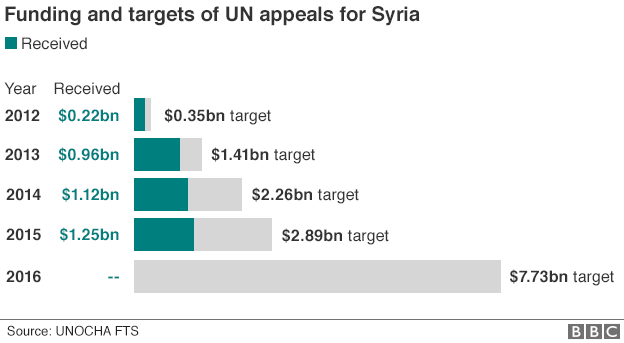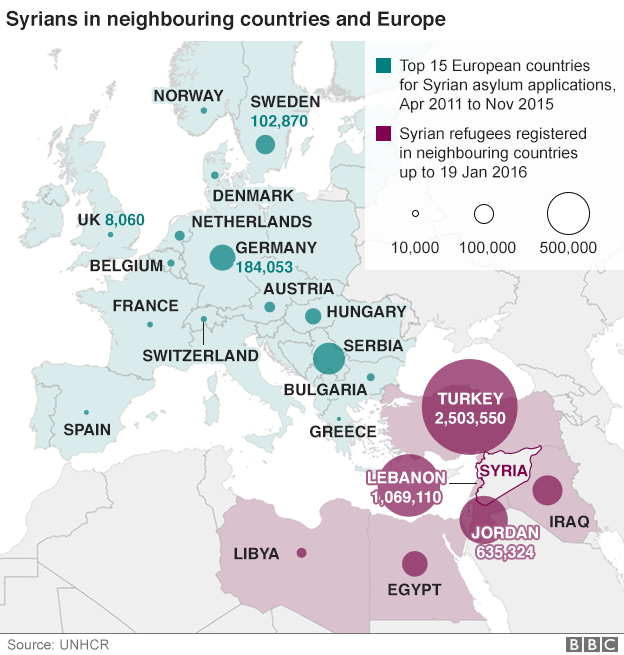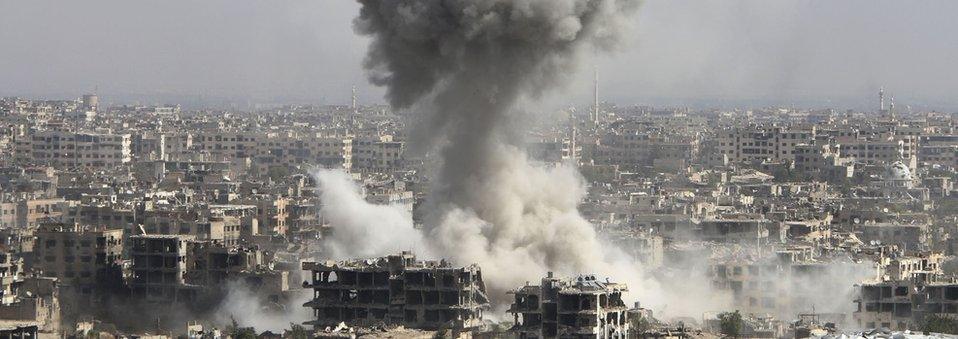Syria conflict: Donor nations pledge $10bn in vital aid
- Published
David Cameron: "I'm pleased that Britain has played its part"
Donor nations meeting in London have pledged more than $10bn to help Syrians affected by the five-year conflict, UK Prime Minister David Cameron announced.
He said the money (£6.8bn) would provide millions in Syria with "life-saving" food, medical care and shelter.
More jobs and schooling would be provided for refugees in neighbouring countries, he said.
In Syria, tens of thousands of people are reported to be fleeing intense fighting near Aleppo.
Turkish Prime Minister Ahmet Davutoglu said an estimated 70,000 Syrians were heading towards its borders amid a Syrian government offensive, backed by Russian air strikes.
In war-ravaged Damascus suburbs
Who is to blame for breakdown of talks?
The offensive prompted the suspension of fledgling UN-brokered peace talks in Geneva.
While the conference has been a financial success, the prospects for ending the war in Syria look bleaker than ever, the BBC's diplomatic correspondent James Robbins says.
Rami Ruhayem reports from Damascus on the Syrian children displaced within their own country
Mr Cameron said at the end of the day-long conference that $6bn had been pledged for 2016 alone, and a further $5bn over the coming years until 2020.
He said Turkey, Jordan and Lebanon - which are housing most of the 4.6 million refugees - had also pledged to ensure all refugee children will have access to education.
"The international union is backing them with the resources which will allow them to ensure there is no lost generation," he said, adding that one million children currently not in school would have access to education by the end of the next school year.
The horrifying statistics that define Syria
The neighbouring countries had also, he said, made a "courageous commitment" to open their economies to provide more jobs - helped by $40bn of loans and the opening of European markets that would create one million new jobs in the region.
UN Secretary General Ban Ki-moon hailed the gathering of 60 countries as a "great success".
"Never has the international community raised so much money on a single day for a single crisis," he said.


The European Union has pledged $3.3bn (€3bn; £2.3bn) this year and intends to "maintain this level of financing" for 2017 and beyond.
The UK pledged an extra $1.7bn until 2020, Germany committed to $2.6bn until 2018, France said it would give $1bn and the US pledged an extra $925m for 2016.
Australia, Belgium, Italy, Poland, Japan, the UAE, Austria, Switzerland, Estonia, Denmark and Finland, along with the World Bank and the European Investment Bank, were among those who also committed funds.
The conference, attended by 30 world leaders, had been hoping to raise $9bn - a total made up of a UN appeal for $7.7bn, external and about $1.3bn requested by regional host governments.
Part of the reason for the record request is the underfunding of previous appeals. Only 43%, external of the $2.9bn pledged to the UN's 2015 appeal has so far been funded.

Hours before the conference began, peace talks between the Syrian regime and opposition were suspended, amid rebel anger over the continuing Russian bombing around Aleppo.
The talks, which opened just two days ago, are expected to resume on 25 February. UN special envoy Staffan de Mistura admitted there had been a lack of progress but said that the negotiations had not failed.
Ban Ki-moon, speaking in London, said that the Syrian people needed "not just food for today, but hope for tomorrow" and urged both sides to "get back to the table, not to secure more gains on the battlefield."
A number of countries criticised Russia for conducting air strikes to help the Syrian army advance.
UK Foreign Secretary Philip Hammond told the BBC the strikes had "increased in intensity dramatically over the last few days... we've got to press the Russians to do something that will actually support this political process, not torpedo it".

What is the Syria conflict?

Why is there a war in Syria?
Anti-government protests developed into a civil war that, four years on, has ground to a stalemate, with the Assad government, the so-called Islamic State group, an array of Syrian rebels and Kurdish fighters all holding territory.
Who is fighting whom?
Government forces concentrated in Damascus and the centre and west of Syria are fighting the jihadists of Islamic State and al-Nusra Front, as well as less numerous so-called "moderate" rebel groups, who are strongest in the north and east. These groups are also battling each other.
How has the world reacted?
Iran, Russia and Lebanon's Hezbollah movement are propping up the Alawite-led Assad government, while Turkey, Saudi Arabia and Qatar back the more moderate Sunni-dominated opposition, along with the US, UK and France. Hezbollah and Iran are believed to have troops and officers on the ground, while a Western-led coalition and Russia are carrying out air strikes.
